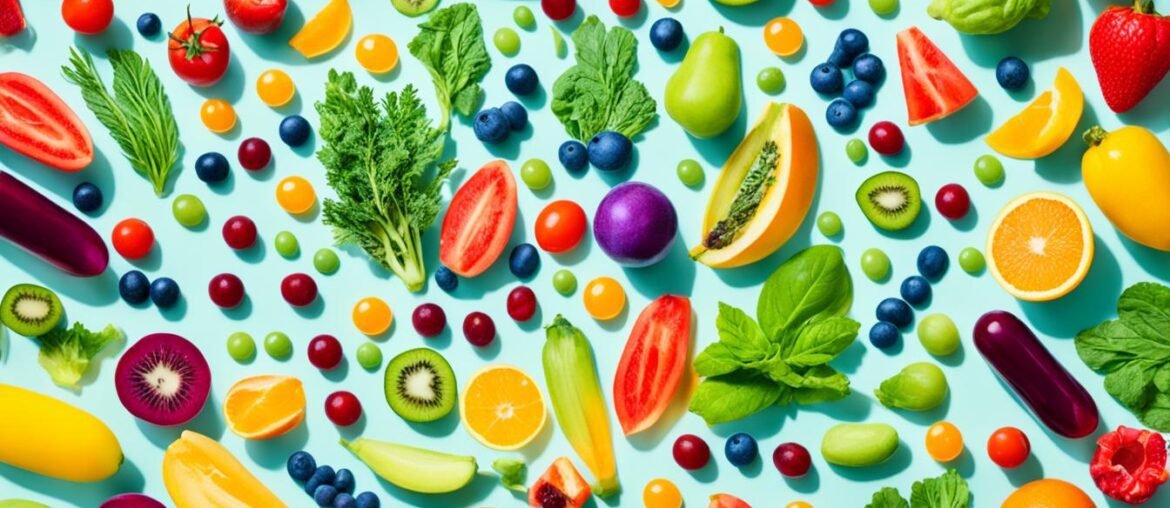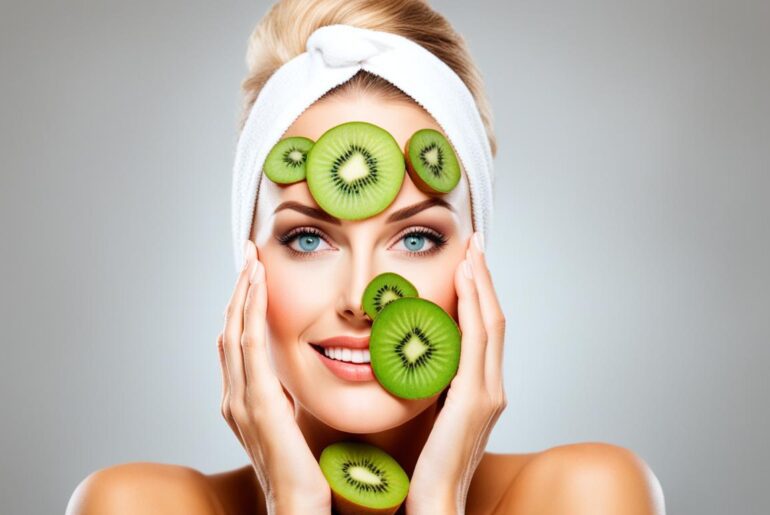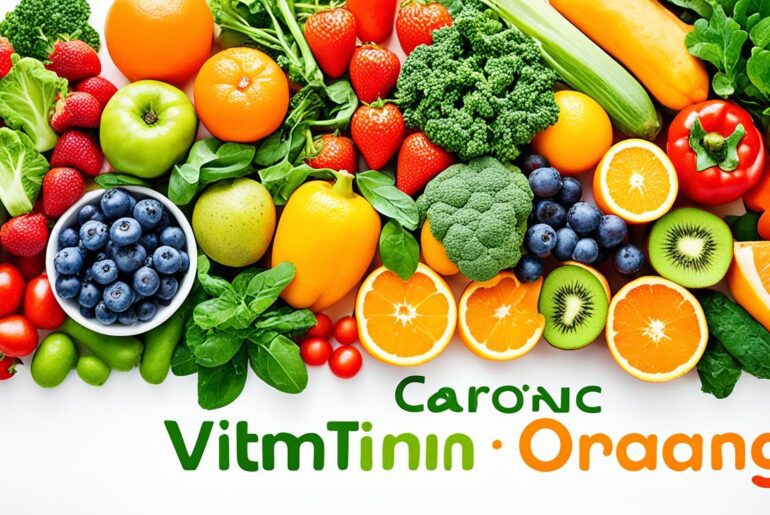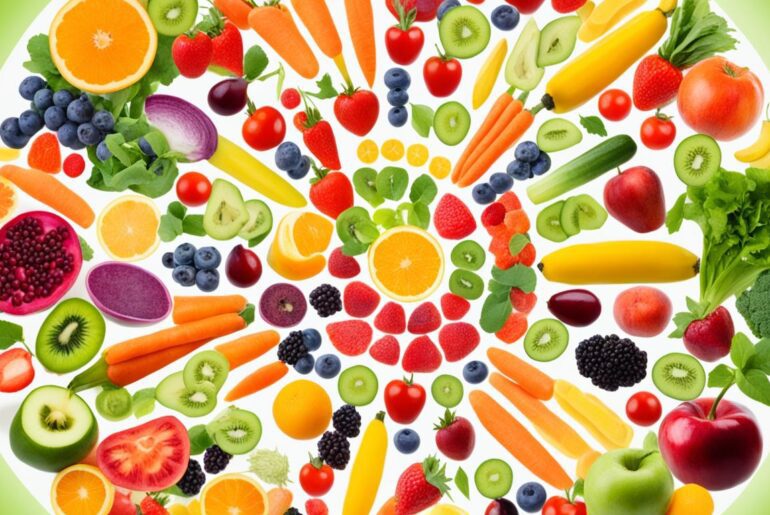Have you ever wondered what it takes to achieve that coveted radiant glow? Is it an expensive skincare routine or a miracle product you’re missing out on? The truth is, the key to skin radiance lies within the essential vitamins that nourish and rejuvenate your skin.
Without these vital nutrients, your skin can become dull and lackluster, no matter how many products you invest in. So, which vitamins should you focus on to promote skin radiance? Let’s uncover the secrets of a glowing complexion.
Key Takeaways:
- Essential vitamins are crucial for maintaining skin radiance and health.
- A healthy diet rich in fruits, vegetables, omega-3 fatty acids, and lean proteins supports skin nourishment and rejuvenation.
- Vitamin A, C, E, and D play key roles in promoting clear, rejuvenated, and glowing skin.
- Antioxidants, omega fatty acids, and B vitamins are also important for skin health and radiance.
- Supplements can be considered if dietary intake of essential vitamins is insufficient.
The Importance of a Healthy Diet for Skin Health
A healthy diet is essential for maintaining skin health and promoting a radiant complexion. Consuming essential nutrients and skin-nourishing vitamins provides the necessary building blocks for skin cell regeneration and rejuvenation. Opting for a diet rich in fruits, vegetables, omega-3 fatty acids, and lean proteins can significantly enhance skin nourishment and overall skin health. By making conscious choices about the foods we eat, we can pave the way for a glowing and vibrant complexion.
Fruits and vegetables are packed with essential nutrients that are vital for skin health. They are rich in vitamins and minerals that contribute to the production of collagen, the protein responsible for maintaining skin’s elasticity and firmness. By including a variety of colorful fruits and vegetables in our diet, such as berries, oranges, spinach, and bell peppers, we can ensure that our skin receives a wide range of antioxidants and vitamins.
Omega-3 fatty acids play a significant role in maintaining skin health. They help to improve skin hydration and elasticity, reducing the appearance of wrinkles and fine lines. Foods like salmon, walnuts, flaxseeds, and avocados are excellent sources of omega-3 fatty acids and should be incorporated into a skin-healthy diet.
Lean proteins, such as chicken, turkey, and tofu, provide amino acids necessary for collagen production and skin repair. Including these proteins in our meals can help support the maintenance and regeneration of healthy skin cells.
“Eating a balanced diet rich in essential nutrients and vitamins is the foundation for healthy skin. It provides the necessary building blocks for skin cell rejuvenation and creates the conditions for a glowing and vibrant complexion.”
By adopting a healthy diet that prioritizes essential nutrients and vitamins, we can support our skin’s health and achieve a radiant complexion. Taking care of our skin from the inside out ensures that it receives the nourishment it needs to thrive. Combine a healthy diet with a proper skincare routine and other lifestyle choices, such as regular exercise and adequate hydration, to maximize the benefits and unlock the full potential of your skin’s natural beauty.
Essential Vitamins and Skin Benefits
| Vitamin | Skin Benefits |
|---|---|
| Vitamin A | Promotes collagen production, helps prevent sun damage, and aids in wound healing. |
| Vitamin C | Supports collagen synthesis, protects against free radicals, and reduces the appearance of wrinkles. |
| Vitamin E | Protects against oxidative stress and inflammation, and nourishes the skin. |
| Vitamin D | Plays a crucial role in skin health and cell growth. |
| B Vitamins | Support skin repair, regulate sebum production, and relieve inflammation. |
| Biotin | Protects skin cells from water loss and helps maintain healthy skin and hair. |
| Antioxidants | Neutralize free radicals and prevent oxidative damage to the skin. |
| Omega Fatty Acids | Maintain moisture and elasticity in the skin. |
Vitamin A for Healthy Skin

Vitamin A is a crucial nutrient for maintaining clear and rejuvenated skin. It plays a vital role in both the upper and lower layers of the skin, offering a range of benefits for skin health and appearance. By incorporating foods rich in vitamin A into your diet, you can ensure an adequate intake of this essential vitamin for optimal skin radiance.
Benefits of Vitamin A for Skin
Vitamin A provides multiple advantages for healthy skin:
- Promotes collagen production: Collagen is a protein that gives your skin its structure and elasticity. Vitamin A stimulates collagen production, helping to reduce the appearance of wrinkles and fine lines.
- Prevents sun damage: Vitamin A acts as a natural sunscreen, protecting your skin from harmful UV rays and preventing sunburn. It strengthens the skin’s natural defense mechanisms and may help reduce the risk of skin cancer.
- Aids in healing: Vitamin A enhances the healing process of cuts, scrapes, and other wounds on the skin. It accelerates cell regeneration and supports the formation of new skin tissue.
- Moisturizes the skin: The moisturizing properties of vitamin A help prevent dryness, keeping your skin soft and supple.
To ensure an adequate intake of vitamin A, incorporate the following foods into your diet:
“Foods rich in vitamin A include cod liver oil, liver, egg yolks, and leafy greens. These nutrient-packed foods can provide the vitamin A necessary for clear and rejuvenated skin.”
Vitamin A Deficiency and Skin Health
Vitamin A deficiency can have negative effects on the skin, leading to dryness, itchiness, and a dull complexion. It can also impair the skin’s ability to heal and recover from wounds or damage.
By incorporating vitamin A-rich foods into your diet, you can prevent deficiency and maintain healthy, clear skin.
Vitamin C for Collagen Synthesis
Vitamin C is a powerful antioxidant that plays a vital role in maintaining the structure of collagen in the skin. Collagen is a protein responsible for skin elasticity and firmness. As we age, collagen production naturally decreases, leading to common signs of aging such as wrinkles and fine lines. By incorporating vitamin C into your skincare routine and diet, you can support collagen synthesis and promote clear, rejuvenated skin.
One of the key functions of vitamin C is its ability to protect the skin against free radicals. Free radicals are unstable molecules that can cause damage to the skin and accelerate the aging process. Vitamin C acts as a potent antioxidant, neutralizing these harmful molecules and preventing oxidative stress.
“Vitamin C is essential for collagen synthesis and protection against free radicals, making it a valuable component in skincare and diet.”
Research has shown that vitamin C can also help reduce the appearance of wrinkles. It promotes the production of collagen and elastin, two proteins that keep the skin supple and resilient. By stimulating collagen synthesis, vitamin C can help smooth out fine lines and wrinkles, giving the skin a more youthful appearance.
You can incorporate vitamin C into your diet by consuming foods rich in this essential nutrient. Some excellent sources of vitamin C include citrus fruits (such as oranges, grapefruits, and lemons), tomatoes, kiwi, strawberries, bell peppers, and dark leafy greens like spinach and kale.
| Foods High in Vitamin C | Vitamin C Content per 100g |
|---|---|
| Oranges | 53.2mg |
| Strawberries | 58.8mg |
| Red Bell Peppers | 127.7mg |
| Kiwi | 92.7mg |
| Kale | 120mg |
Adding these foods to your daily meals or enjoying them as snacks can contribute to clearer, healthier skin. However, it’s important to note that vitamin C is water-soluble and can be easily lost during cooking or food processing. To fully benefit from its rejuvenating effects, consider incorporating raw or lightly cooked vitamin C-rich foods into your diet.
Additionally, topical application of vitamin C can enhance its benefits for the skin. Look for skincare products containing stabilized vitamin C, such as serums or creams. These formulations can help deliver vitamin C directly to the skin, promoting collagen production and protecting against free radicals.
By harnessing the power of vitamin C through your diet and skincare routine, you can support collagen synthesis, protect your skin from damage, and achieve a clearer, rejuvenated complexion.
Vitamin E for Skin Protection

When it comes to protecting your skin from oxidative stress and inflammation, vitamin E is a powerful ally. This fat-soluble vitamin acts as an antioxidant, neutralizing free radicals that can damage the skin cells and accelerate the aging process. Incorporating vitamin E-rich foods into your diet can nourish the skin and promote a clear and healthy complexion.
Vitamin E is commonly found in various food sources, including:
- Nuts and seeds
- Avocado
- Olive oil
Adding these foods to your meals and snacks can provide you with the skin nourishing vitamins necessary for maintaining clear and healthy skin.
Benefits of Vitamin E for Skin Protection
Vitamin E offers several benefits when it comes to skin protection:
- Antioxidant properties: Vitamin E helps protect the skin against oxidative stress caused by free radicals, which can damage skin cells and contribute to premature aging.
- Moisturization: This vitamin supports the skin’s natural moisture barrier, keeping it hydrated and preventing dryness.
- Inflammation reduction: Vitamin E has anti-inflammatory properties that can help calm skin irritation and redness.
- Enhanced healing: It aids in the healing of wounds, cuts, and burns, promoting healthier skin regeneration.
To make the most of vitamin E’s skin-protecting benefits, be sure to include it in your daily diet and skincare routine.
Expert Insight
“Vitamin E is a vital nutrient for maintaining healthy skin. Its potent antioxidant properties protect against free radicals and promote skin health and rejuvenation. Including vitamin E-rich foods in your diet can help nourish and protect your skin from environmental damage.” – Dr. Emma Johnson, Dermatologist
| Food Source | Vitamin E Content (per 100g) |
|---|---|
| Almonds | 26.2 mg |
| Sunflower seeds | 36.6 mg |
| Spinach | 3.2 mg |
| Avocado | 2.1 mg |
| Olive oil | 14.4 mg |
Note: The values mentioned in the table represent approximate content and may vary depending on the source and preparation methods.
Incorporating vitamin E-rich foods into your diet can significantly contribute to maintaining clear, vibrant, and healthy skin. Remember to consult with a healthcare professional for personalized advice and determine the ideal intake of skin nourishing vitamins.
Vitamin D for Skin Health
Vitamin D plays a crucial role in maintaining skin health and promoting cell growth. It is produced naturally when the skin is exposed to sunlight. Adequate levels of vitamin D can contribute to a glowing and healthy complexion.
While sunlight is the primary source of vitamin D, certain foods can also provide this essential nutrient. Foods rich in vitamin D include fatty fish like salmon and mackerel, cod liver oil, mushrooms, and cheese.
To ensure an adequate intake of vitamin D for glowing skin, consider incorporating these foods into your diet. Additionally, you can consult with a healthcare professional to determine if supplementation is necessary.
| Food Source | Vitamin D Content |
|---|---|
| Fatty fish (salmon, mackerel) | Approximately 450 IU per 3 oz serving |
| Cod liver oil | Approximately 450 IU per 1 teaspoon |
| Mushrooms (exposed to UV light) | Approximately 400 IU per 1 cup |
| Cheese (cheddar, Swiss) | Approximately 30 IU per 1 oz |
By ensuring an adequate intake of vitamin D, whether through sunlight or dietary sources, you can support skin health and contribute to a radiant complexion.
B Vitamins for Skin Repair

When it comes to skincare, B vitamins are often overlooked but play a crucial role in maintaining healthy and glowing skin. Two important B vitamins for skin repair are niacin and pantothenic acid. Let’s explore how these vitamins contribute to nourished and rejuvenated skin.
Niacin
Niacin, also known as vitamin B3, is essential for the growth and repair of skin cells. It helps stimulate collagen production, improve skin barrier function, and reduce redness and inflammation. By supporting new cell growth, niacin helps replenish the skin and promote a radiant complexion.
Include niacin-rich foods in your diet to ensure an adequate intake of this skin-nourishing vitamin. Sources of niacin include:
- Eggs
- Lean meats, such as chicken and turkey
- Green leafy vegetables, like spinach and kale
- Whole grains
Pantothenic Acid
Pantothenic acid, or vitamin B5, is another important B vitamin for skin health and repair. It plays a role in regulating sebum production, the natural oil that moisturizes and protects the skin. By maintaining balanced sebum levels, pantothenic acid can help prevent acne and promote clear and glowing skin.
Ensure your diet includes pantothenic acid-rich foods to support skin repair and nourishment. Some sources of pantothenic acid include:
- Liver
- Eggs
- Chicken
- Whole grains
By incorporating these B vitamins into your diet, you can provide your skin with the necessary nutrients for repair, rejuvenation, and a luminous glow.
Biotin for Skin and Hair Health

Biotin, also known as vitamin B7, is an essential nutrient that plays a crucial role in maintaining the health of your skin and hair. It is responsible for protecting your skin cells from water loss and regulating fatty acid metabolism. By including biotin-rich foods in your diet, you can promote glowing and clear skin.
Foods rich in biotin include:
- Eggs
- Beef
- Salmon
- Almonds
- Legumes
These biotin sources are packed with nutrients that nourish your skin from within, playing a vital role in maintaining its health and radiance. Including them in your diet can contribute to the overall clarity and glow of your skin.
Remember, healthy skin starts from the inside out, so make sure to incorporate biotin-rich foods into your daily meals for a clear and radiant complexion.
The Role of Antioxidants in Skin Health

Antioxidants play a crucial role in maintaining skin health and promoting rejuvenation. They are powerful compounds that neutralize free radicals, which are unstable molecules that can cause oxidative damage to the skin. By counteracting the harmful effects of free radicals, antioxidants help protect and nourish the skin, resulting in a healthier and more radiant complexion.
The Benefits of Antioxidants for Skin Health
Antioxidants offer a range of benefits when it comes to skin health:
- Preventing premature aging: Antioxidants help prevent and reduce the appearance of fine lines, wrinkles, and age spots, keeping the skin looking youthful and vibrant.
- Protecting against sun damage: Exposure to the sun’s harmful UV rays can lead to skin damage, including sunburn and the breakdown of collagen. Antioxidants help shield the skin from these damaging effects.
- Reducing inflammation: Inflammation is a common cause of skin redness, irritation, and acne. Antioxidants have anti-inflammatory properties that can soothe the skin and promote a clearer complexion.
- Enhancing skin rejuvenation: Antioxidants stimulate cell turnover and promote the growth of new, healthy skin cells, helping to rejuvenate the skin and improve its overall appearance.
Sources of Antioxidants
There are numerous sources of antioxidants that you can incorporate into your diet to support skin health:
| Food | Antioxidant Content |
|---|---|
| Berries (blueberries, strawberries, raspberries) | High |
| Oranges, lemons, and other citrus fruits | High |
| Leafy greens (spinach, kale, Swiss chard) | High |
| Avocado | High |
| Green tea | High |
| Nuts and seeds (almonds, walnuts, flaxseeds) | Moderate |
| Beans and legumes | Moderate |
| Dark chocolate | Moderate |
Incorporating these antioxidant-rich foods into your diet can provide the essential nutrients needed for skin health and rejuvenation. Additionally, topical skincare products containing antioxidants can further enhance the benefits for your skin.
Remember, maintaining a balanced and varied diet that includes a wide range of antioxidants is key to supporting long-term skin health. By nourishing your skin from the inside out with these vital nutrients, you can enjoy a radiant and healthy complexion.
Omega Fatty Acids for Skin Nourishment

Omega fatty acids are essential nutrients for skin health, providing the nourishment needed for radiant and healthy skin. These fatty acids play a vital role in maintaining moisture and elasticity, helping to keep the skin supple and youthful. Incorporating foods rich in omega fatty acids into your diet can promote skin radiance and support overall skin health.
Some excellent sources of omega fatty acids include:
- Nuts, such as walnuts and almonds
- Seeds, such as flaxseeds and chia seeds
- Oily fish, such as salmon and mackerel
- Plant-based oils, such as olive oil and avocado oil
These foods contain omega-3, omega-6, and omega-9 fatty acids, which offer a range of benefits for the skin. Omega-3 fatty acids, in particular, help reduce inflammation and support the skin’s natural healing process. Including these skin radiance vitamins in your diet can provide the essential nutrients your skin needs for optimal health and vitality.
Quotes:
“Omega fatty acids are like nourishment for the skin, helping to keep it hydrated, resilient, and vibrant.” – Dr. Samantha Simmons, Dermatologist
“Including omega fatty acids in your diet is a simple and effective way to support skin health and radiance.” – Sarah Johnson, Nutritionist
Supplements for Skin Radiance

If you find it challenging to meet your vitamin needs solely through your diet, supplements can be a viable option. However, it is crucial to consult with a healthcare professional, such as your doctor or dermatologist, to determine if supplements are necessary and safe for you. They can assess your individual needs and provide personalized recommendations.
One supplement that can help promote skin radiance is fish oil. Fish oil is rich in omega-3 fatty acids, which are known for their anti-inflammatory properties and ability to nourish the skin from within. Additionally, fish oil is a great source of vitamin D, which plays a crucial role in skin health and can contribute to a glowing complexion.
Another option to consider is a multivitamin that includes skin-nourishing vitamins. These multivitamins are formulated to provide a comprehensive blend of essential nutrients, including vitamins A, C, E, and D, that support skin health and radiance.
Remember: Always consult with a healthcare professional before starting any new supplements to ensure they align with your specific needs.
For further guidance on which supplements may be beneficial for your skin radiance journey, consult with a healthcare professional who can provide personalized advice.
Personal Recommendation:
“I highly recommend incorporating fish oil and a multivitamin into your daily routine to support skin radiance. These supplements can provide the essential vitamins and nutrients your skin needs to stay healthy and glowing. However, it’s important to consult with a healthcare professional to determine the right dosage and ensure compatibility with your overall wellness plan.”
– Dr. Emily Walker, Dermatologist
Supplements for Skin Radiance Comparison:
| Supplement | Benefits |
|---|---|
| Fish Oil |
|
| Multivitamin |
|
When considering supplements, it’s important to remember that they should complement a healthy diet and lifestyle. They are not a substitute for a well-balanced and nutrient-rich eating plan. Prioritize nourishing your skin from the inside out by incorporating a variety of fruits, vegetables, lean proteins, and whole grains into your meals.
While supplements can provide an extra boost of essential vitamins for skin care, they work best in conjunction with a holistic approach to skincare, including proper cleansing, regular moisturizing, and sun protection.
Conclusion
Achieving skin radiance requires a comprehensive approach that includes a healthy diet, adequate sun exposure, and a proper skincare routine. By prioritizing the intake of essential vitamins like A, C, E, and D, you can nourish and rejuvenate your skin for a glowing and radiant complexion.
Vitamin A plays a key role in maintaining clear and rejuvenated skin. Incorporate foods rich in vitamin A, such as liver, egg yolks, and leafy greens, to promote skin health.
Vitamin C is essential for collagen synthesis and protects against wrinkles. Include vitamin C-rich foods like citrus fruits and dark leafy greens in your diet to promote clear and rejuvenated skin.
Vitamin E, found in foods like nuts and avocado, protects against oxidative stress and inflammation, contributing to a healthy complexion.
Proper sun exposure for vitamin D synthesis is crucial for skin health. Foods like fatty fish and mushrooms can also provide a source of vitamin D.
Leverage the power of B vitamins, found in eggs, green leafy vegetables, and whole grains, to support skin repair and maintain a glowing complexion.
Biotin, found in foods like eggs and almonds, plays a vital role in protecting skin cells and maintaining clear and healthy skin.
Lastly, ensure a rich intake of antioxidants from fruits, vegetables, nuts, and tea to neutralize free radicals and support overall skin rejuvenation.
Remember to consult a healthcare professional before making any significant changes to your diet or starting new supplements. Power up your skincare routine with the essential vitamins and nourishing foods, and watch your skin radiate with health and vitality.
FAQ
What are the essential vitamins for skin radiance?
The essential vitamins for skin radiance include Vitamin A, Vitamin C, Vitamin E, Vitamin D, B vitamins, Biotin, antioxidants, and omega fatty acids.
Why is a healthy diet important for skin health?
A healthy diet provides the necessary nutrients and vitamins for skin cells, promoting a radiant complexion. It supports skin nourishment and rejuvenation.
How does Vitamin A benefit the skin?
Vitamin A prevents sun damage, promotes collagen production, and aids in the healing of cuts and scrapes. It helps maintain clear and rejuvenated skin.
What role does Vitamin C play in skin health?
Vitamin C is a powerful antioxidant that maintains collagen structure, protects against free radicals, and reduces the appearance of wrinkles. It contributes to clear and rejuvenated skin.
How does Vitamin E protect the skin?
Vitamin E is a fat-soluble vitamin that protects the skin from oxidative stress and inflammation. It nourishes the skin and promotes a healthy complexion.
What is the importance of Vitamin D for skin health?
Vitamin D, produced from sunlight exposure, plays a crucial role in skin health and cell growth. It contributes to a glowing and healthy complexion.
Why are B vitamins important for skin repair?
B vitamins, including niacin and pantothenic acid, support new skin cell growth, regulate sebum production, and help alleviate skin inflammation. They contribute to nourished and glowing skin.
What are the benefits of Biotin for skin and hair health?
Biotin, also known as Vitamin B7, protects skin cells from water loss, regulates fatty acid metabolism, and maintains healthy skin and hair. It promotes glowing and clear skin.
What role do antioxidants play in skin health?
Antioxidants neutralize free radicals and prevent oxidative damage to the skin. They contribute to skin rejuvenation and overall skin health.
How do omega fatty acids nourish the skin?
Omega fatty acids maintain skin moisture and elasticity. They can be obtained from sources like nuts, seeds, oily fish, and plant-based oils, promoting skin nourishment and radiance.
Can supplements help support skin radiance?
Supplements, like fish oil for omega-3 fatty acids and vitamin D, as well as multivitamins that include skin-nourishing vitamins, can provide additional support for skin radiance. Consult with a healthcare professional before starting any new supplements.
What should I do to achieve skin radiance?
Achieving skin radiance requires a comprehensive approach, including a healthy diet, adequate sun exposure, and a proper skincare routine. Ensure an adequate intake of essential vitamins, incorporate antioxidant-rich foods and omega fatty acids, and consult with a healthcare professional before making significant changes to your diet or starting new supplements.




